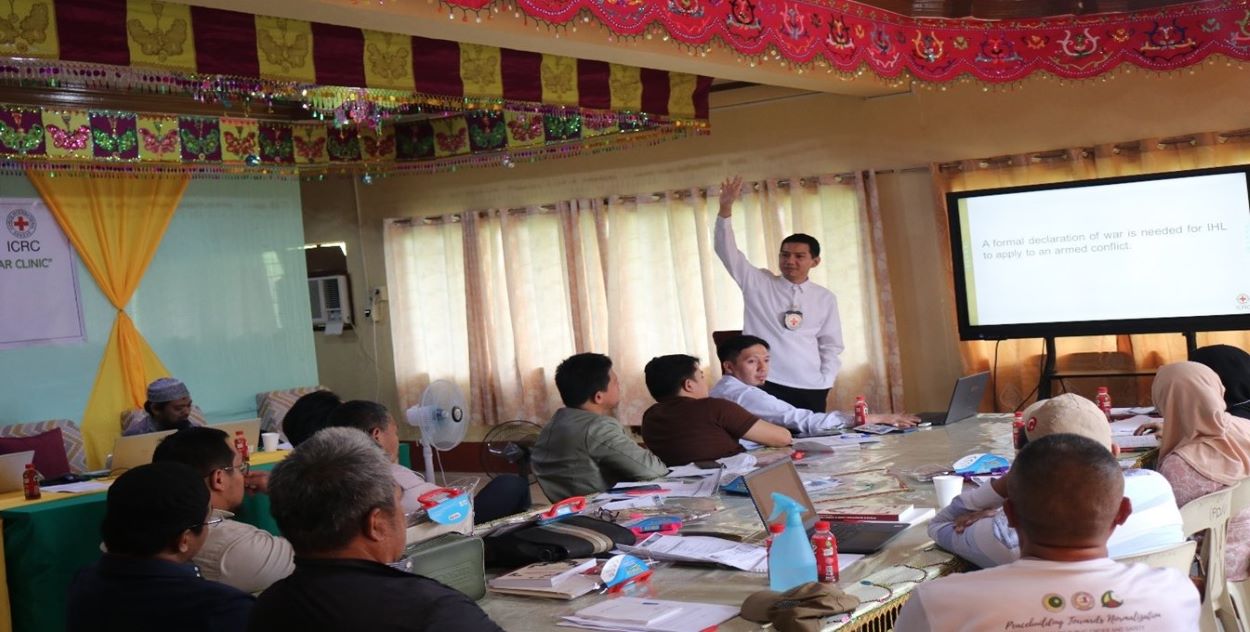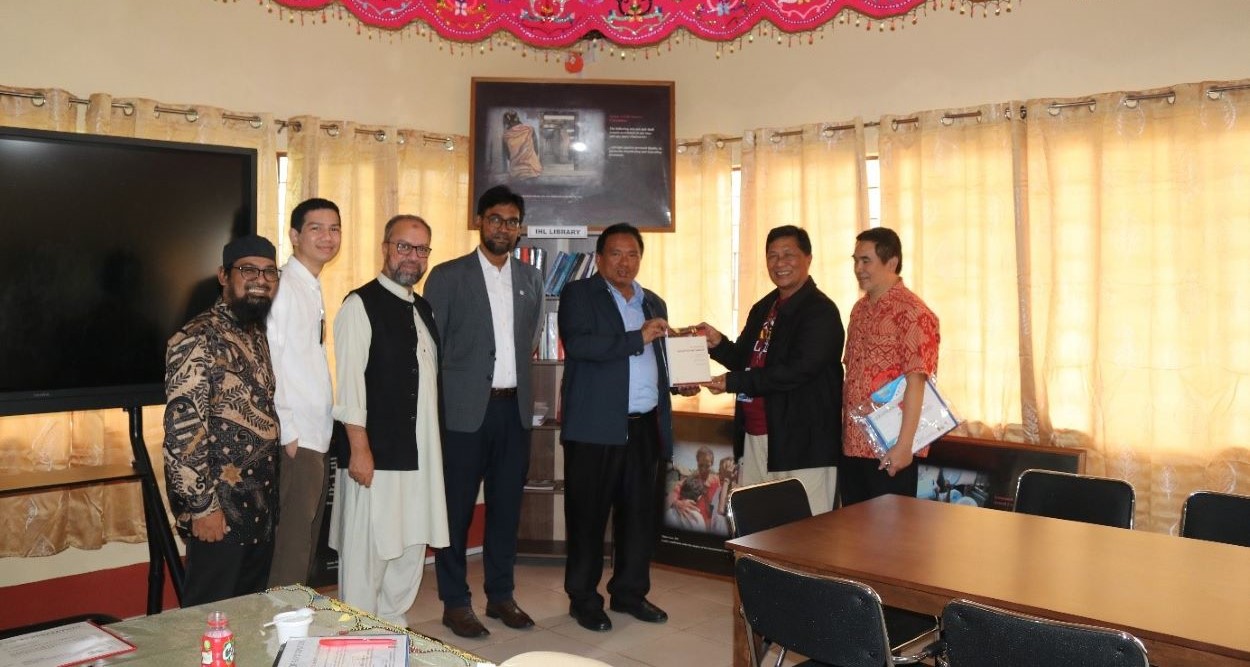The International Committee of the Red Cross (ICRC) has been a long-standing partner of the Mindanao State University (MSU) System in the southern Philippines. Previously, the ICRC collaborated on two publication projects with MSU Marawi and MSU Sulu. The King Faisal Center for Islamic Arabic and Asian Studies (KFCIAAS) of MSU Marawi has collaborated with the ICRC on many events, including the translation and launch of an Arabic publication titled “Articles on Islam and International Humanitarian Law” translated into the local dialect Meranao in 2021, and a sensitization session on Islam and IHL with female faculty and students in 2022. From September 26 to 28, 2023, another event called the “IHL and Siyar Clinic” was held at MSU Marawi in collaboration with the KFCIAAS.
The idea of clinical legal education was inspired by law schools, mostly in the United States, where students offer free legal counsel to a variety of clients while being guided and supervised by university professors. Several universities around the world have begun offering legal clinics on various branches of international law, including IHL. The IHL Clinic of the Kalshoven-Gieskes Forum at Leiden University is an illustration of the latter and is likely the first IHL Clinic in Europe. IHL clinics at law schools allow students to take part in the development and application of IHL directly through practical “real world” work, ranging from instruction to research and fact-finding, litigation to high-level advocacy, and many areas in between. These opportunities do much more than just help these students become competent, self-reflective lawyers, which is unquestionably a major objective of any clinical setting. Additionally, clinical IHL work integrates clinical pedagogy with contemporary problems in armed conflict to enrich students’ legal education and give them the opportunity to participate in the promotion, implementation, and enforcement of IHL.
The Islamic law of war is known as Siyar and similarly includes primary and secondary sources. The Qur’an and the Hadith constitute primary sources and are considered eternal, immutable, and unchanging revolving around God’s divine nature and revelation. The secondary sources are based on raye (opinion), ijma (scholar consensus) and qiyas (analogy). All these bodies of literature constituted the material from which the fuqahā’ (jurists) developed the Islamic law of war in the literature of Fiqh (Islamic law) under such headings as al-jihād, al-Siyar, al-maghāzī. Contemporary Muslim scholars add to those headings some other names such as akhlāq al-ḥarb (the ethics of war) and al-qanūn al-dawlī al-insānī fī al-Islām (Islamic international humanitarian law).

The aim of the IHL and Siyar Clinic is to provide an avenue for Muslim scholars and practitioners of Shariah Islamia to engage with one another, foster exchange of information and engage on clinical legal teachings of IHL and Siyar. The clinic will promote understanding of convergences and any possible divergences between IHL and Siyar. It will strengthen cooperation and deepen dialogue among Islamic institutions, scholars, and the ICRC for the common purpose of preserving the life and dignity of victims of armed violence. It will highlight the issues warranting immediate attention, such as the safety of the civilians, sick or wounded combatants, medical personnel and facilities, religious personnel, and humanitarian workers during conflict situations. The clinic will be an avenue to open debate to find common ground for neutral and impartial humanitarian action, and for exchange and complementarity between humanitarian actors in the current situation in the Southern Philippines, particularly the Bangsamoro region.
The first-ever IHL and Siyar clinic included 20 participants from various fields and backgrounds, including academia, Islamic scholars, legal, community leaders, and non-state armed groups from the Moro National Liberation Fronts (MNLF) and Moro Islamic Liberation Fronts (MILF), all of whom are from Marawi City, Lanao del Sur, and Lanao del Norte. The participants were divided into six groups and asked to work together to conduct research on the assigned topic and write a short abstract of at least 300 words. The assigned topics are listed below:
| Group No. | Assigned Topic | Group Composition |
| 1 |
Islamic law and IHL perspective on conduct of hostilities |
Participants from KFCIAAS MSU Marawi |
| 2 |
Protection of persons, objects and cultural property according to Islamic Law and IHL |
Participants from KFCIAAS MSU Marawi |
| 3 |
Protection for health-care personnel and facilities, Religious Personnel and Humanitarian Actors in the light of Islamic law and IHL |
Participants from MNLF – Lanao del Sur |
| 4 |
Capture and detention of prisoners of war according to Islamic law and IHL |
Participants from MILF – North Eastern Mindanao Front |
| 5 |
Dignified management of the dead in the light of Islamic law and IHL |
Participants from MILF – North Western Mindanao Front |
| 6 |
Contemporary challenges of IHL and Islamic law |
Participants from KFCIAAS MSU Marawi |

Based on the abstracts, the groups created presentations that were delivered by the group leaders they had chosen. Two weeks prior to the clinic, all reference materials were made available to the participants, and they worked on answering 100 questions about IHL and Siyar. At the event’s closing ceremony, Dr. Rashid M. Paca, Executive Vice-President of the MSU System in Marawi, stated that the KFCIAAS and ICRC’s efforts would aid academic, community, and religious leaders in realizing humanitarian norms, values, and principles following the post-conflict situation in Marawi.
Later, the KFCIAAS with the support of the ICRC established an IHL and Islam corner at the institute for students and faculty to gain further knowledge on IHL and Islamic Law of Armed Conflict (Siyar).
Please find below a selection of the presented abstracts.
Group 1: Abstract on Islamic Law and IHL Perspective on Conduct of Hostilities
The laws and principles governing the conduct of hostilities in armed conflicts are critical elements in ensuring the protection of civilians and combatants. This present study provides an overview of the Islamic law and International Humanitarian Law (IHL) perspectives on the conduct of hostilities in armed conflicts. It examines the similarities and differences between Islamic principles and IHL regulations on conduct of hostilities, focusing on their approaches towards minimizing harm to civilian populations during conflict. It explores the moral framework and guidelines for war established by Shari’ah and Islamic jurisprudence (fiqh) which emphasizes the protection of civilians, proportionality, and the humane treatment of prisoners of war. The Islamic perspective on the conduct of hostilities includes a range of doctrines and teachings derived from the Quran and the Sunnah (sayings and actions) of the Prophet Muhammad. In contrast, IHL plays a fundamental role in regulating the means and methods of warfare, striking a balance between military necessity and the humanitarian principles that underpin armed conflict. IHL focuses on two fundamental principles: distinction and proportionality. The principle of distinction requires parties to distinguish between civilians and combatants, civilians being protected from direct attacks unless they are directly participating in hostilities. Combatants, on the other hand, can be targeted by military operations. However, even combatants retain certain protections, such as the prohibition of torture and inhumane treatment. A comprehensive understanding of the Islamic and IHL perspectives on the conduct of hostilities is crucial for policymakers, military practitioners, and humanitarian organizations. By recognizing and respecting the principles rooted in both Islamic teachings and international law, it becomes possible to promote effective conflict management strategies, minimize civilian casualties, and establish groundwork for post-conflict reconciliation

Group 2: Abstract on Protection of Person, Objects and Cultural Property According to Islamic Law and IHL
Since the beginning of humanity, conflicts had already occurred. Currently, conflicts are inevitable due to different reasons such as advancing political and economic interest. This study enhances the understanding of an Islamic approach to human rights, object and cultural property. Islamic law serves as a legal foundation for many Muslim states, making it crucial to discuss how to protect cultural heritage in Islam. Needless to state, violent conflicts are now evolving since battle dynamics and weapons have changed as conflict has become more urbanized, more destructive, putting more people and cultural sites at danger of collateral harm. Hence, strategies and plans to forestall massive destructions should also be enhanced and developed without evading from the generally accepted fundamental principles of Islam and IHL. By examining how Islam interacts with international law, we can improve cultural heritage protection and advance human rights in the Islamic world. Due to historical and colonial influences, poor governance, and other factors, the majority of wars occur in Muslim countries, which has negative effects such as a lack of democracy, respect for human rights, and destruction of significant cultural heritage. What transpired in many Muslim countries in the Middle East is what prompted this study to explore the comprehensive discussion of Islam regarding the protection of persons, object and cultural property, far from the notion of merely being collateral damage during conflict. Moreover, it is commonly agreed that upholding IHL is important because it has the power to at least lessen the extent of harm or to infuse a measure of humanity into armed combat circumstances, where acts of brutality, barbarism, and destruction take place. As per Islamic teachings, wars have a moral character and the morality of the goals and means are equally important. Prophet Muhammad, himself, dictated this war code which serves to protect the living and non-living things. Any action which contradicts this dictation by the Prophet is un-Islamic and should be abhorred in the name of Islam. Hence, it is not, but incumbent for our group study to conclude with the recommendations that since there is no absolute way to prevent wars, we should, instead, broaden the rule on prohibiting weapons of mass destruction, policies of armed-conflict affecting people, object, and cultural properties, and prescribe concrete consequences if violations are committed. This should not only be lodged in International Humanitarian Law, but also must be indicated expressly in the domestic laws of States. As popularly stated: “Even wars have limits.”
Group 6: Abstract on Contemporary Challenges of IHL and Islamic Law
The present study examines the contemporary challenges in international humanitarian law and Islamic law. This law is an initiative to draw attention to the need to reconcile Islamic law and the laws of armed conflict in order to achieve a reformatted, thorough, and contemporary humanitarian law. Our group study examines the different challenges in international humanitarian law and Islamic law in contemporary times during armed conflict. In a number of areas, from the classification of armed conflicts to the employment of new technology, the character of current armed conflicts continues to provide difficulties for the application and respect of IHL. To guarantee that IHL continues to serve its protective purpose in times of armed conflict, it is important to comprehend and address these problems. For instance, the number of children wounded or killed in armed conflict has increased by up to 300% since the beginning of the last decade. Thus, Islamic law also contains conflict-prevention measures that aim at maintaining peace and security. “Jihad,” for instance, is a just, defensive war: Muslims have an obligation to defend themselves, their territories, and their religious freedom against an enemy’s aggression. Therefore, fighting should target only enemy combatants, not civilians. And it goes without saying that treaties must be respected. Thus, the present study concludes with the recommendation that international humanitarian law and Islamic law must be adhered to, recognized, and respected by every state in times of armed conflict.

